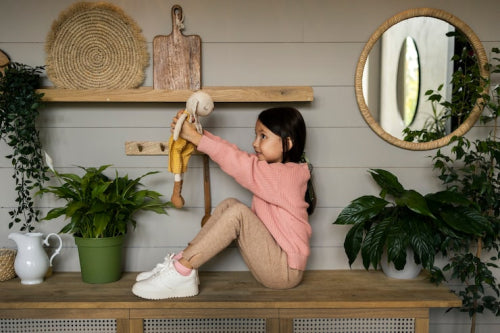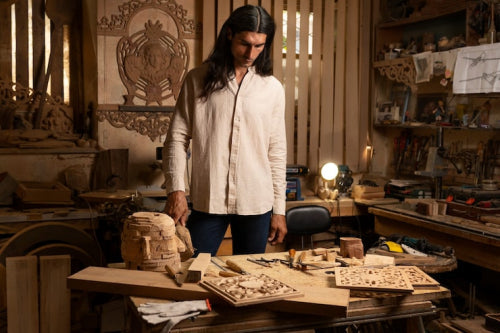Quick Listen:
Imagine a dining table carved to fit the precise contours of your home's quirky corner or a bookshelf tailored to cradle your collection of oversized art books. Bespoke furniture crafted to a client's exact specifications is no longer a privilege of the elite. It's a growing movement, a deliberate turn away from the sameness of mass-produced goods. Today's consumers, from city lofts to suburban homes, are seeking pieces that embody their unique stories, values, and aspirations, creating spaces that feel deeply personal and enduring.
This trend marks a cultural shift. People want furniture that's more than functional it's an extension of who they are. Whether it's a reclaimed wood desk for a home office or a custom sofa in a hue no catalog could offer, bespoke pieces speak to individuality. According to a report by Verified Market Research, the bespoke furniture market, valued at $35.47 billion in 2023, is expected to soar to $58.24 billion by 2031, growing at a steady 6.3% CAGR through the forecast period. These figures underscore a truth: personalization isn't a fleeting trend it's a defining force in modern design.
Mass-market furniture lacks heart, filling rooms with bland, short-lived pieces. Frequent breakdowns spark frustration, as replacements erode style and sentiment. At MMC Wood Creations, Udaipur artisans shape heirloom furniture with enduring craftsmanship and cozy elegance, creating pieces that echo your identity, ensuring your home radiates warmth and timeless connection. Shop Now!
The Power of Personalization
What fuels this demand? First, there's an undeniable hunger for uniqueness. In an age where curated lives are broadcast on social media, homes have become canvases for self-expression. Bespoke furniture allows clients to shape every detail wood type, finish, dimensions creating pieces that are as distinctive as their owners. A TechSci Research report highlights that the global bespoke furniture market, worth $16.11 billion in 2024, is projected to reach $24.32 billion by 2030, driven by a 7.16% CAGR. This growth reflects a broader shift toward furniture that's not just practical but profoundly personal, crafted to fit specific tastes and spaces.
Sustainability is another key driver. Unlike mass-produced items, which often prioritize low cost over longevity, bespoke furniture is built to endure. Consumers are increasingly choosing ethically sourced materials reclaimed timber, eco-friendly finishes to align with environmental values. This is especially evident in the Asia Pacific, where the customized furniture market is set to expand from $583.98 million in 2023 to $1,188.85 million by 2033, with a robust 7.37% CAGR. In countries like China and Japan, buyers gravitate toward custom designs that marry craftsmanship with sustainability, creating pieces that are both beautiful and responsible.
Technology has also democratized the process. Advanced design tools like CAD software enable artisans to bring a client's vision to life with pinpoint accuracy, whether it's a retro-inspired armchair or a sleek kitchen island. For companies like MMC Wood Creations, these tools blend the precision of modern tech with the soul of traditional craftsmanship, making bespoke furniture more attainable than ever.
Crafting Stories, One Piece at a Time
Take the example of MMC Wood Creations, a boutique furniture maker celebrated for its handcrafted designs. A couple in Chicago recently commissioned them for a dining table to fit their loft's unconventional layout. No standard piece would do. The result? A striking walnut table, its edges gently rounded to echo the couple's Scandinavian aesthetic, with legs angled to hug the room's odd corners. “This isn't just furniture,” they said in a heartfelt review. “It's the centerpiece of our home, where we gather, laugh, and live.”
This emotional resonance is what makes bespoke furniture unique. Each piece carries a narrative from the client's initial concept to the artisan's final touch. In markets like Europe and North America, custom furniture is becoming a hallmark of high-end homes and boutique offices. Clients aren't just purchasing objects; they're investing in pieces that reflect their identity, values, and vision for their spaces.
The Hurdles of Customization
Bespoke furniture, for all its appeal, comes with challenges. The process is time-intensive, often stretching weeks or months from design to delivery a stark contrast to the instant gratification of retail giants. Cost is another hurdle. Premium materials and skilled labor drive up prices, making custom pieces a significant investment. Yet for many, the value of a one-of-a-kind creation outweighs the expense.
Sourcing sustainable materials poses its own difficulties. High-quality, eco-friendly wood like the reclaimed oak or cherry favored by MMC Wood Creations requires rigorous vetting to ensure ethical origins. Any lapse can undermine consumer trust, particularly among those who prioritize sustainability. Then there's the complexity of execution. Turning a client's vision into reality demands clear communication and exceptional skill. A misjudged color or an off-kilter design can derail an entire project, underscoring the need for precision and expertise.
Opportunities in a Niche Market
These challenges, however, are also gateways to opportunity. Bespoke furniture appeals to a discerning clientele those who view custom pieces as both functional art and a status symbol. For artisans and companies like MMC Wood Creations, this niche fosters deep brand loyalty. Clients who commission one bespoke piece often return, captivated by the personal touch and unparalleled quality.
The economic impact is equally compelling. Custom furniture supports local artisans woodworkers, upholsterers, designers preserving traditional skills and creating jobs. In regions like the Asia Pacific, where demand for tailored designs is booming, this industry bolsters small businesses and independent craftsmen. By focusing on quality over mass production, bespoke makers contribute to a more sustainable economy, crafting pieces that endure both physically and culturally.
A Future Shaped by Craft
The bespoke furniture market is poised for continued growth. Experts predict that as consumers prioritize individuality and sustainability, demand will only rise. Innovations like biodegradable materials or lab-grown wood could further elevate the industry's eco-credentials, while technologies like 3D rendering and augmented reality streamline the design process, allowing clients to preview their creations with unprecedented clarity.
For furniture makers, the strategy is straightforward: embrace personalization. Highlight the story behind each piece, from the artisan's craft to the client's vision. Champion sustainability as a core principle, not a marketing ploy. And leverage technology to enhance the process without losing the human touch that defines bespoke work. As the market evolves, these principles will keep artisans at the forefront of a rapidly changing industry.
A Legacy of Meaning
In an era of disposability, bespoke furniture stands as a testament to permanence. It's a chair that weathers decades of use, a desk etched with the marks of a life well-lived. With the global market projected to reach $58.24 billion by 2031, according to Verified Market Research, the allure of custom furniture lies not just in its craftsmanship but in its deeper significance. These pieces are more than objects they're reflections of who we are, what we value, and how we choose to live. In a world that often feels fleeting, bespoke furniture offers something timeless: a legacy crafted by hand, for hearts and homes.
Frequently Asked Questions
What is bespoke furniture and why is it becoming so popular?
Bespoke furniture refers to custom-made pieces crafted to a client's exact specifications, including dimensions, materials, and design details. It's becoming increasingly popular because consumers are seeking unique, personalized pieces that reflect their individual style and values, moving away from mass-produced furniture. The global bespoke furniture market is projected to grow from $35.47 billion in 2023 to $58.24 billion by 2031, driven by demand for personalization and sustainability.
Is custom furniture more sustainable than mass-produced options?
Yes, bespoke furniture is generally more sustainable than mass-produced alternatives. Custom pieces are built to endure for decades using high-quality, often ethically sourced materials like reclaimed timber and eco-friendly finishes. Unlike mass-produced furniture that prioritizes low cost over longevity, bespoke furniture supports local artisans, reduces waste through quality construction, and allows consumers to choose environmentally responsible materials that align with their values.
How much does bespoke furniture cost compared to regular furniture?
Bespoke furniture typically costs significantly more than mass-produced pieces due to premium materials, skilled craftsmanship, and the time-intensive custom design process. While the exact cost varies depending on materials, complexity, and artisan expertise, many buyers view custom furniture as a worthwhile investment for one-of-a-kind pieces that are built to last decades. The higher upfront cost often translates to better durability and timeless design that won't need frequent replacement.
Disclaimer: The above helpful resources content contains personal opinions and experiences. The information provided is for general knowledge and does not constitute professional advice.
You may also be interested in: Storage
Mass-market furniture lacks heart, filling rooms with bland, short-lived pieces. Frequent breakdowns spark frustration, as replacements erode style and sentiment. At MMC Wood Creations, Udaipur artisans shape heirloom furniture with enduring craftsmanship and cozy elegance, creating pieces that echo your identity, ensuring your home radiates warmth and timeless connection. Shop Now!
Powered by flareAI.co




